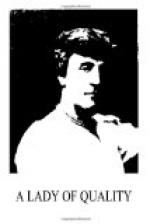“Jack,” cried Sir Jeoffry, his eyes still farther starting from their sockets. “Jack! what say you? I cannot hear.”
The next instant he sprang up, shrieking, and thrusting with his hands as if warding something off.
“Keep back!” he yelled. “There is green mould on thee. Where hast thou been to grow mouldy? Keep back! Where hast thou been?”
His friends at table started up, staring at him and losing colour; he shrieked so loud and strangely, he clutched his hair with his hands, and fell into his chair, raving, clutching, and staring, or dashing his head down upon the table to hide his face, and then raising it as if he could not resist being drawn in his affright to gaze again. There was no soothing him. He shouted, and struggled with those who would have held him. ’Twas Jack Oxon who was there, he swore—Jack, who kept stealing slowly nearer to him, his face and his fine clothes damp and green, he beat at the air with mad hands, and at last fell upon the floor, and rolled, foaming at the mouth.
They contrived, after great strugglings, to bear him to his chamber, but it took the united strength of all who would stay near him to keep him from making an end of himself. By the dawn of day his boon companions stood by him with their garments torn to tatters, their faces drenched with sweat, and their own eyes almost starting from their sockets; the doctor who had been sent for, coming in no hurry, but scowled and shook his head when he beheld him.
“He is a dead man,” he said, “and the wonder is that this has not come before. He is sodden with drink and rotten with ill-living, besides being past all the strength of youth. He dies of the life he has lived.”
’Twas little to be expected that his boon companions could desert their homes and pleasures and tend his horrors longer than a night. Such a sight as he presented did not inspire them to cheerful spirits.
“Lord,” said Sir Chris Crowell, “to see him clutch his flesh and shriek and mouth, is enough to make a man live sober for his remaining days,” and he shook his big shoulders with a shudder.
“Ugh!” he said, “God grant I may make a better end. He writhes as in hell-fire.”
“There is but one on earth who will do aught for him,” said Eldershawe. “’Tis handsome Clo, who is a duchess; but she will come and tend him, I could swear. Even when she was a lawless devil of a child she had a way of standing by her friends and fearing naught.”
So after taking counsel together they sent for her, and in as many hours as it took to drive from London, her coach stood before the door. By this time all the household was panic-stricken and in hopeless disorder, the women-servants scattered and shuddering in far corners of the house; such men as could get out of the way having found work to do afield or in the kennels, for none had nerve to stay where they could hear the madman’s shrieks and howls.




